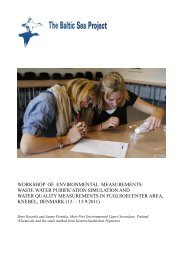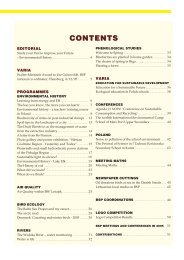newsletter_2008_1.pdf - 5.84 MB - The Baltic Sea Project
newsletter_2008_1.pdf - 5.84 MB - The Baltic Sea Project
newsletter_2008_1.pdf - 5.84 MB - The Baltic Sea Project
Create successful ePaper yourself
Turn your PDF publications into a flip-book with our unique Google optimized e-Paper software.
Ecological Economics and Sustainable<br />
fishing<br />
BSP students participating in the conference in Vilnius<br />
learned and discussed one afternoon about theories of<br />
ecological economics and sustainable development. <strong>The</strong><br />
students also applied their new theoretical insights to<br />
an actual case: fishing for cod in the <strong>Baltic</strong> <strong>Sea</strong>. <strong>The</strong> two<br />
seminar leaders from Nacka Gymnasium in Sweden, Carina<br />
Bladh and Rolf Erikson, teachers of economics and biology<br />
respectively, have complimentary bases of knowledge<br />
and a common interest in this new academic field that<br />
integrates fundaments of ecological, social and economic<br />
sciences. <strong>The</strong>y wish it could be a more frequent theme in<br />
education, at least in upper secondary schools, and the<br />
enthusiasm and sharpness of the seminar participants in<br />
Vilnius proved that it should be.<br />
<strong>The</strong> seminar addressed questions and issues of importance<br />
when defining sustainable development, and the students<br />
were guided into the thoughts and ideas of ecological<br />
economics, a fairly new scientific discipline that aims to<br />
integrate environmental and social considerations into<br />
economic calculations and decisions. For example, gross<br />
national product (GNP), the most widely used measure<br />
of growth and welfare, does not take into account costs<br />
of environmental and social degradation when summing<br />
up the economic values of goods and services produced<br />
within a country. It should be replaced by new welfare<br />
indexes like the Human Development Index (HDI) or the<br />
Index of Sustainable Economic Welfare (ISEW), which also<br />
include other important factors for the well being of human<br />
and which give a much truer picture of the state of development<br />
and justice in the world. <strong>The</strong> over-exploitation<br />
of our world’s resources was illustrated by the “ecological<br />
footprint”, showing how much of the productive surface of<br />
the globe is used up by different counties and their populations.<br />
Not surprisingly, there is a need for more than one<br />
globe if everyone lives their lives as we do in the Western<br />
world, whilst the ecological footprint of poor people in<br />
poor countries is very little. <strong>The</strong> “tragedy of the commons”,<br />
when resources like air, water, fish, etc, which are owned<br />
by everyone but over-exploited by a greedy few, was also<br />
discussed.<br />
After a rather long session of theories and discussions<br />
about how to form global sustainable development and<br />
after a refreshing break, the students were invited to play<br />
roles as <strong>Baltic</strong> <strong>Sea</strong> fishermen. Ships from the nine riparian<br />
states went out to fish for cod in a game specially constructed<br />
in order to demonstrate the effects of the tragedy<br />
of the common. Consequently, after a few “years” of<br />
unregulated fishing and despite the natural reproduction<br />
of fish, there was no cod left in the imaginary <strong>Baltic</strong> <strong>Sea</strong>.<br />
When the game restarted, the fishermen were advised to<br />
discuss and make agreements. <strong>The</strong>n the fish stock lasted<br />
longer, and the participants could envision the possibility<br />
that the reproduction and population growth of cod in the<br />
<strong>Baltic</strong> <strong>Sea</strong> could be managed in favour of big and sustainable<br />
catches, although egoistic interests of catching more<br />
than others always lurked under the surface and threatened<br />
to deplete the stock once more. <strong>The</strong> game session<br />
was concluded by listening to the remarks and analyses of<br />
the observers who had taken notes of everything that happened<br />
in and around the imaginary <strong>Baltic</strong> <strong>Sea</strong>.<br />
<strong>The</strong> last part of the seminar described the actual situation<br />
of cod and fishing in the <strong>Baltic</strong> <strong>Sea</strong>. Graphs on biomass,<br />
catches, economic balance, etc. all show a dramatic<br />
decrease, and there is no doubt that cod and cod fishing<br />
will soon become history in the <strong>Baltic</strong> <strong>Sea</strong>. <strong>The</strong> reason for<br />
this situation was analysed with the help of economic<br />
models, showing how competition and short-term profits<br />
govern the fishing policy and how EU subsides and illegal<br />
fishing make the situation even worse. <strong>The</strong> presentation<br />
also focused on cod as a predator and its effect on other<br />
organisms and the food chain in the <strong>Baltic</strong> <strong>Sea</strong>. It was<br />
shown how the total ecosystem will change completely<br />
and irreversibly because of the overfishing of cod. In a sustainable<br />
perspective, this is disastrous for the cod and for<br />
the ecosystem, but it is also unacceptable for the society<br />
in which fishing is an important economic activity and for<br />
the consumers who will miss a first class food product,<br />
which, if well managed, could be a cheap and common<br />
“everyday” meal. <strong>The</strong> session ended with the formation of<br />
small groups in which the students discussed what could<br />
be done to stop the overfishing of cod in the <strong>Baltic</strong> <strong>Sea</strong>.<br />
Carina Bladh<br />
Rolf Erikson<br />
Nacka Gymnasium, Sweden<br />
E-mail: rolf.erikson@nacka.se<br />
EvENTS<br />
7





